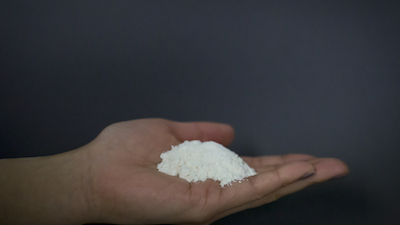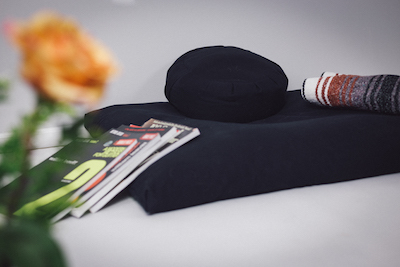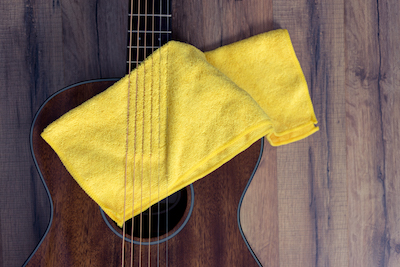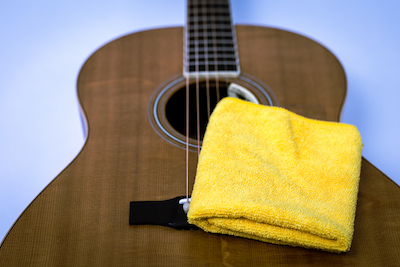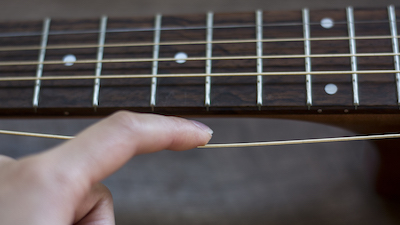What To Do About Sweaty, Clammy Hands
Some people produce more sweat than others. Everybody has had a time when they felt that their hands were clammy. Maybe you were nervous, or in a hot and humid environment.
Other people, for whatever reason, sweat profusely from the hands.
Excessive sweat can affect your guitar playing, and can even be bad for your guitar strings.
Tips for Your Hands
If you are affected by this problem, you probably know already. Here are some general tips for keeping your hands dry during your guitar playing.
Tip #1: baby powder
Try adding a little bit of baby powder to your palms before you play. This will help keep your hands dry, and prevent you from slipping and losing your grip.
Tip #2: deep breaths
It might help to calm your nerves. You can practice this skill by taking slow, deep breaths, or even trying meditation. If you are nervous, you will start to feel clammy, and you may look down to see your hands shaking. This is not going to help you play at your best.
Tip #3: air conditioning
You should maintain a cool and dry practice space. This will help reduce perspiration.
Tips for Maintaining Your Guitar
Over time, your sweat will interact chemically with both the guitar and the strings. Here are a few tips to keep your guitar in good order.
Tip #1: wipe the strings
At the very least, consider keeping a small microfiber cloth nearby to wipe the strings down after you play. This will prevent most of the corrosion caused by leaving sweat on the surface of the strings. Suggested: Planet Waves UNTREATED Cloth[?]Affiliate Link
Tip #2: wipe the guitar
If you’re going to wipe down the strings, why not take it a step further and wipe down the guitar as well? You can use the microfiber cloth to clean underneath the strings, as well as the body itself. This can be done infrequently. Suggested: Planet Waves UNTREATED Cloth[?]Affiliate Link
Tip #3: wax on, wax off
After wiping down the strings, guitar neck, and guitar body, you can take it a step further with the Dunlop System 65[?]Affiliate Link, a set of guitar maintenance fluids that includes a string cleaner, a guitar body cleaner, and a polishing wax.
Tip #4: clean out the grime
The guitar fingerboard will gradually accumulate a layer of grime, especially under the strings. Let’s not go into details as to what this grime is made of, because you really don’t want to know. Suffice to say, you can scrub it all off with your microfiber cloth, but it’s a little easier to use Steel Wool, 0000 Grade[?]Affiliate Link; be advised that if the fretboard is made of a particularly soft material, steel wool may scratch it. 0000 steel wool will not scratch a typical rosewood or ebony fretboard. Only use the 0000 ’superfine' grade.
Tip #5: change your strings
There is only so much you can do to protect your strings from the corrosive effects of environmental moisture and sweat from your hands. The more often you change your strings, the better your guitar will play. Some players have to change the strings once per week or more. For the average learner, once a month is a pretty good rule of thumb. Although you may be able to get away with waiting up to three months between changing strings, especially if you are using coated strings.
Tip #6: use coated strings
If you’re dealing with unwanted string corrosion, coated strings such as Elixir can help your strings play brighter and last longer.
- For coated acoustic, try Elixir Nanoweb Acoustic Coated Strings (Light)[?]Affiliate Link for beginners and Elixir Nanoweb Acoustic Coated Strings (Med)[?]Affiliate Link for intermediate+.
- For electric guitar strings, try Elixir Nanoweb Electric Coated Strings (Light)[?]Affiliate Link.
Coda
Some people just perspire more than others! If you’re one of them, taking steps to keep your guitar dry will help you play more comfortably, and lengthen the life of your strings.
 As the creator of Hub Guitar, Grey has compiled hundreds of guitar lessons, written several books, and filmed hundreds of video lessons. He teaches private lessons in his Boston studio, as well as via video chat through TakeLessons.
As the creator of Hub Guitar, Grey has compiled hundreds of guitar lessons, written several books, and filmed hundreds of video lessons. He teaches private lessons in his Boston studio, as well as via video chat through TakeLessons.